Last Updated on January 14, 2022 by Grow with Bovees
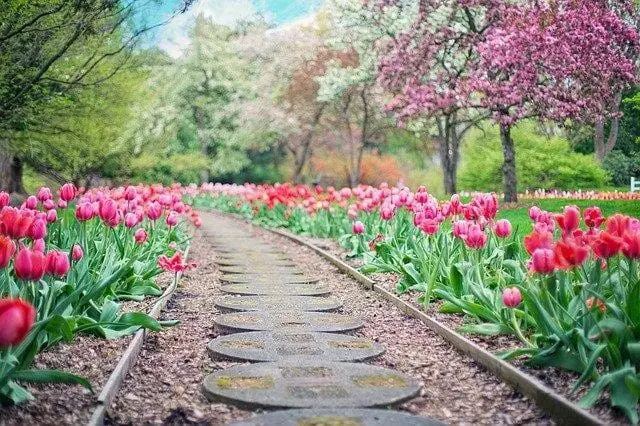
You are probably aware of the various benefits of hydrogen peroxide as an oxidizer, bleaching agent and disinfectant.
It is also an effective antiseptic used commonly to treat small cuts, burns, etc., for water treatment and it is also found in many personal care products such as mouthwashes, hair dyes, toothpaste, bleach, etc.
However, if you are not an experienced gardener, what you’re probably not aware of and will be surprised to learn is that hydrogen peroxide is very good for your plants, great for gardening jobs and can help to keep your garden beautiful and thriving.
In this article, we’ll give you a complete lowdown about hydrogen peroxide for plants in the garden and the different gardening tips and ways you can use them to keep it healthy and flourishing.
What Is Hydrogen Peroxide?
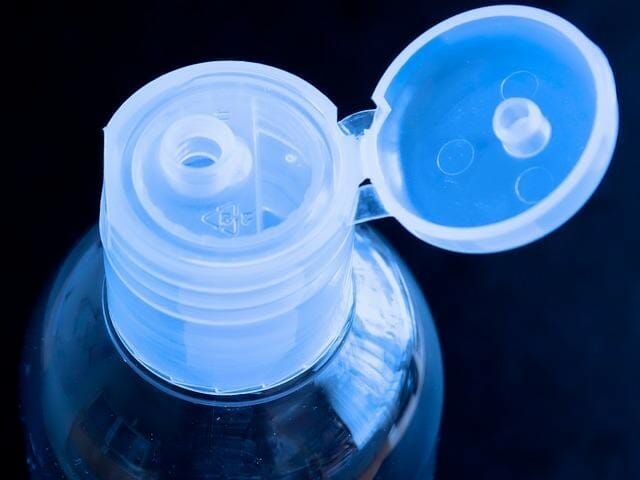
A chemical compound that occurs naturally, hydrogen peroxide or H2O2 is a pale blue-colored liquid, which is quite similar to water in terms of its chemical composition, except that it has an additional oxygen atom.
Hydrogen peroxide is present in the human body, rainwater and surface water.
Hydrogen peroxide is a clear liquid that is a little more viscous compared to water. Typically, the hydrogen peroxide available in the pharmacy is a 3% or 6% solution; however, you can also get it in higher concentrations, which is generally for use in labs and industries.
Because of the oxygen-oxygen bond, pure hydrogen peroxide is highly unstable and decomposes when exposed to light, which is the main reason why it is usually stored in dark-colored bottles or brown plastic containers.
Is Hydrogen Peroxide Safe For Plants?
For safe use, you must dilute the hydrogen peroxide before using it on your plants. You can figure out the strength of hydrogen peroxide from the fact that in the highest concentration, this chemical compound is used as rocket fuel.
In very low concentrations, it is quite good for your plants. Hydrogen peroxide breaks down to produce water molecules and oxygen atoms that bond together to form oxygen and may even bond with the other minerals present in the soil.
The extra oxygen is quite beneficial, and the bonds formed enable the microorganisms present in the soil to use the minerals better.
However, the hydrogen peroxide solution must be in a very diluted form because fungi and bacteria can be destroyed even with 0.5% of hydrogen peroxide and may end up destroying beneficial bacteria and fungi too, which you don’t want.
A strong product of this chemical is used to kill weeds. However, too much can be harmful to the soil and even kill your plants.
Be Cautious
When using hydrogen peroxide solution as a weed killer or at a higher concentration, or before it is diluted with water, always wear a pair of waterproof rubber gloves.
It is important that you keep this product out of reach of children and away from any pets. Even though this chemical is often used to treat and clean cuts — in which case it should also be used sparingly to avoid more damage to the area — it should never be ingested. Ingestion of hydrogen peroxide can cause a great number of problems.
Under no circumstances should one try to boil or heat up this chemical. As mentioned before, it is a very unstable product that will explode when it comes into contact with heat. Be sure to store the colored container in a dark and cool place. This will also prolong its shelf life.
Is Hydrogen Peroxide Eco-Friendly?
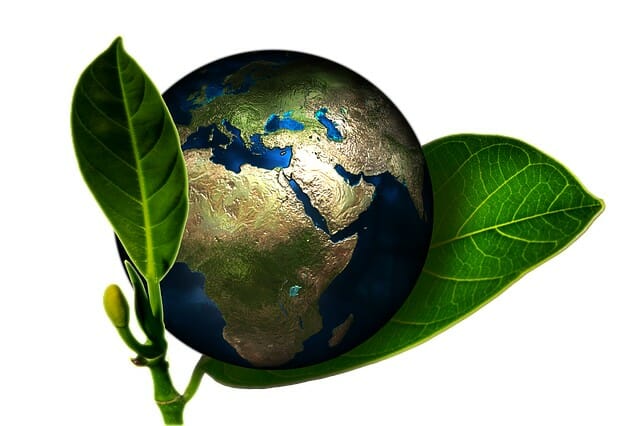
Depending on the concentration of the hydrogen peroxide solution and how much you use will determine its benefits. And, if used in excess, hydrogen peroxide can be quite harmful to your soil, beneficial insects and plants.
However, since hydrogen peroxide is a natural compound and breaks down into oxygen and water, it is a friendly alternative compared to other artificial pesticides, herbicides and other garden treatments that are more harmful and pollute the environment.
Below, we’ll discuss some popular garden uses of this friendly product, hydrogen peroxide on troubled plants.
Disinfecting Tools, Pots, Potting Benches and Greenhouses
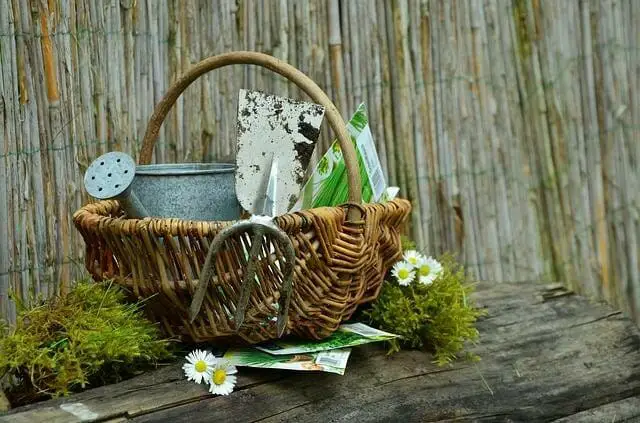
Hydrogen peroxide solution inhibits antimicrobial activity and is often used in labs and medical facilities to disinfect work surfaces and surgical tools. It is also commonly used in homes to clean various surfaces and items.
Hydrogen peroxide, being a disinfectant, is an excellent way by which you can properly clean the various pots, garden pruning tools, containers, benches, greenhouses, etc. in your garden.
You can use hydrogen peroxide of 6% to 9% concentration to sterilize everything and kill harmful pathogens and germs, while also removing dirt and stubborn marks from all the surfaces.
By dipping your gardening tools into a solution of hydrogen peroxide before using them on your plants, you can also prevent the introduction of dangerous pathogens to your plants.
A 10% hydrogen peroxide solution can kill mold spores and can also remove and prevent the growth of mildew and mold on hard surfaces such as your greenhouse walls, etc.
Soil Aeration and Treatment of Root Rot
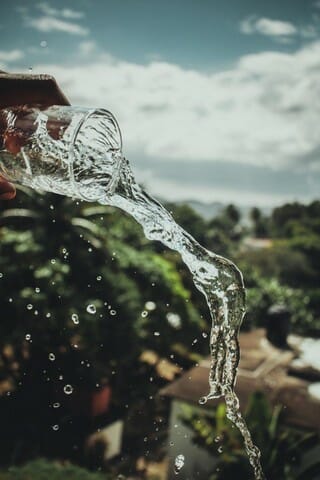
Good manual soil aeration is vital for the healthy growth of your plants. When the soil becomes hard and compacted, it affects plant growth because the nutrients and oxygen will not get to the plants properly.
Compacted soil can also cause root rot. Another problem that causes root rot is overwatering your plants, which fills up the air pockets in the soil, causing a shortage of oxygen. This, in turn, causes the roots of the plants to suffocate, rot and eventually die due to lack of nutrients.
A weak solution of 2-3 teaspoons of 3% hydrogen peroxide with 1-liter of water can help to treat root rot and prevent this plant disease, root rot. Pour the mixture around the base of the plants and roots carefully. Avoid watering your plants again after applying the hydrogen peroxide mixture until the soil on the top dries completely.
The extra oxygen from the hydrogen peroxide provides your plant’s roots with the oxygen they need for nutrient uptake, helps to aerate the soil and also prevents root rot. Hydrogen peroxide also ensures that the roots are strong and healthy.
Typical Signs & Symptoms Of Root Rot
There are a few root rot symptoms that your plant and plant roots will present when suffering from root rot.
Root rot is one of the most common problems gardeners face and, if not treated, one symptom will lead to another and the plant eventually perishes. The most common time gardeners see root rot is in tomato and potato gardens. These signs include:
- Stunted plant growth
- Plant roots appear mushy and black and easily fall apart on contact
- Plants start wilting
- Yellowing of leaves
Spraying Fungus-Affected or Sick Plants
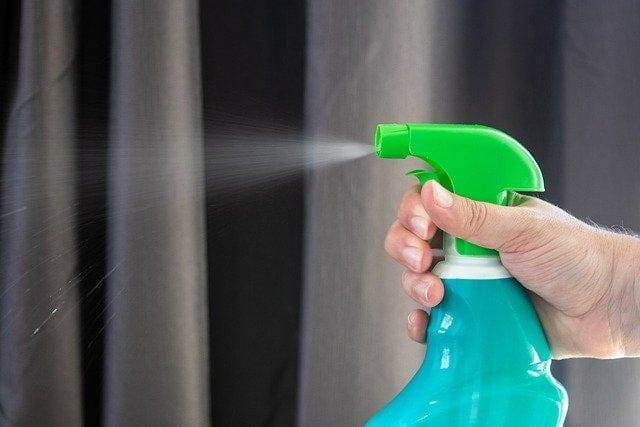
Fungal growth or fungal infection on your plants can cause them to become very weak and prevent them from growing properly.
The strong disinfectant properties of hydrogen peroxide is used in fungus treatment and helps to effectively combat different kinds of fungi infections such as mold growth, powdery mildew and difficult fungus gnats as well as eggs of fungus gnats in plants. Hydrogen peroxide oxidizes the initial infection and gets rid of it.
So, if you see built-up mold on plants or any signs of fungal infections such as white spots, powdery mildew fungus or rust in your plants, mix 2 cups (0.47 l) of 3% hydrogen peroxide in 1-liter of water, fill a spray bottle with it and spray the solution on the affected plants.
Make sure to use the proper dilution because too much hydrogen peroxide can burn the plants. You can also use this solution to treat other kinds of plant infections and get rid of the harmful bacteria and soil mites from the soil.
However, an important thing to remember is that the free radical oxygen from the hydrogen peroxide can also eliminate the beneficial fungi and bacteria from the soil and so, you must use this method only if you have exhausted other methods of getting rid of the fungi from the plants.
Sanitizing Seeds With Hydrogen Peroxide Solution
The presence of any pathogens in the seeds can kill the young seedlings before they can take hold. You can prevent this by disinfecting the seeds by soaking them in 3% hydrogen peroxide for around 30 minutes before sowing them.
However, before sowing the seeds, make sure to wash them thoroughly with clean water. The hydrogen peroxide helps to kill all the harmful pathogens present in the seeds and sanitizes them.
Hydrogen Peroxide For Plants, Soaking Seeds and Washing Sprouts
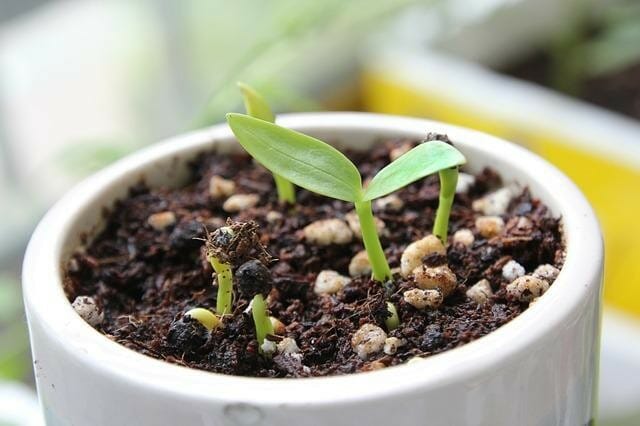
Soaking seeds in diluted hydrogen peroxide can help accelerate the germination of seeds and also ensure healthy growth in the future.
Sprouting seeds require a high amount of oxygen and the extra oxygen from the hydrogen peroxide can be very beneficial. In 1 liter of water, mix 1 to 2 teaspoons of 3% hydrogen peroxide and soak seeds in this solution.
If you have already planted the seeds, then you can use this solution to water the seedling tray. Not only does the hydrogen peroxide help the seeds to germinate faster, increases the success rates, kills any pathogens in the seeds and also helps the roots of the seedling to develop better.
If you’re growing sprouts either for commercial or for personal use, disinfecting the sprouting trays with food grade hydrogen peroxide is a good practice to prevent contamination by bacteria like salmonella, E. coli, listeria, etc. that can cause food-borne illnesses.
Also, if your plants growing in pots are facing problems with diseases, then it may be a problem with the growing medium. Drenching the potting soil/growing medium and spraying the plants with diluted hydrogen peroxide can help to prevent any of these problems.
Fertilizing Your Plants
If you want the plant in your home to be fertilized better and want to strengthen their root system, using hydrogen peroxide can help with this because the extra oxygen in the hydrogen peroxide enables the plants to absorb the valuable nutrients, organic matter and minerals that are present in the soil more effectively.
Mix a teaspoon of 3% hydrogen peroxide in 1 gallon (3.79 l) of warm water and pour this solution into the soil. This works as an excellent fertilizer that can help to boost the growth of your plants.
Keeping Pests Away
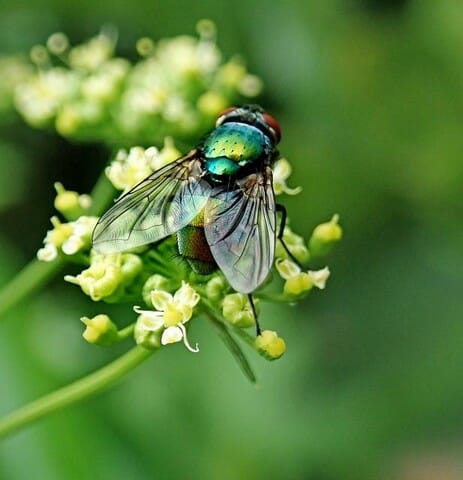
Hydrogen peroxide is an excellent and effective pest control. Not only is this chemical pest control solution quite inexpensive, but it is eco-friendly too. Mix a cup of 3% of hydrogen peroxide with a cup of water and spray this mixture on all the plants in your garden to rid your garden from pests.
Hydrogen peroxide can help to keep away common garden pests and insects such as aphids, houseflies and sap-sucking pests like stink bugs, fungus gnats, etc.
The oxidizing effect of hydrogen peroxide also helps to kill the eggs and larvae of pests that are harmful to your plants.
Getting Rid Of Aphids
Aphids are rated to be part of the top ten gardening issues. They have a sap sucking nature and quickly has devastating effects on plants, such as severe damage to leaves. Aphids most commonly feed on plants in groups, making them quite aggressive.
Food grade hydrogen peroxide is a great solution to rid your garden of these pesky monsters. To avoid harming healthy bits of your plant, use a solution with 1-3% strength and soak the soil surrounding the plant and the entire plant itself with antimicrobial.
Using a spray bottle to apply the solution is convenient, as the spritz may reach areas where aphids are not visible as well as kill aphid larvae.
Water Treatment
Hydrogen peroxide is also commonly used to treat the water that you use in your garden. Ordinary tap water can be toxic to some plants, and it is often advised to use rain water or filtered water instead.
If you do not have those at hand, simply treat your tap water with hydrogen peroxide by adding a small amount to your watering can before watering your plants with it.
This compound’s strong oxidation property will eliminate any harmful chemicals or pesticides, which are harmful to your plants, from the tap water — this includes chlorine.
If you are into hydroponic gardening, adding this solution to your water tank, will provide the water with a proper dose of oxygen. It also helps to purify the water, which in turn will aid your plants in the absorption of more vital nutrients.
How Long Is Hydrogen Peroxide Active In Water?
The lifespan of active hydrogen peroxide in water depends on the cleanliness of the water upon mixing the two.
Deionized water or distilled water will last for long periods of time. In tap water, hydrogen peroxide is less effective due to the presence of some impurities that react with the solution.
How Often Should You Apply Hydrogen Peroxide to Plants?
The frequency of treatment with hydrogen peroxide essentially depends on the health of your plants. For healthy plants, a thorough spray with the preventative mixture of hydrogen peroxide after every rainfall is sufficient.
In case of infested or sick plants, then you should spray the plants thoroughly for around 3 to 5 days. Monitor how your plants are doing and take a call based on your judgment.
How to Use Hydrogen Peroxide on Your Tomato Plants to Prevent Fungal Diseases
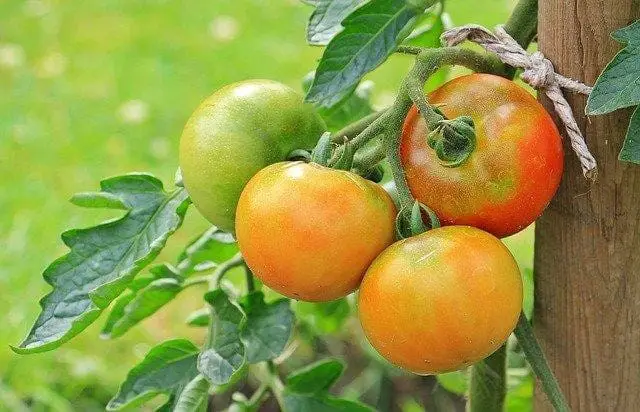
Tomatoes are quite delicate and are often susceptible to bacterial and fungal diseases. A mixture of very diluted hydrogen peroxide when sprayed on the plants can help to prevent fungi such as early blight or leaf spot. The oxidation that occurs helps to kill fungi and even mold.
To make an anti-fungal solution, mix 6 ounces (0.23 kg) or 12 tablespoons of 3% hydrogen peroxide with 1 gallon of water. You can either spray the mixture onto the tomatoes or pour it directly on the soil.
If the soil has fungus, mold or bacteria growing, then pour the hydrogen peroxide mixture into the soil like you would water the plants. This helps to sterilize the soil, and kill the harmful pathogens by oxidizing them.
Alternatively, if you notice fungus or mold growing on the plants, then spray the hydrogen peroxide mixture directly on the plant. This will help to kill mold or fungus and also combat bacterial infections.
Begin by testing the hydrogen peroxide mixture on the leaves and then wait for around 48 hours to see if there is any damage. If everything is fine, then you can spray all the tomatoes in your greenhouse.
To treat fungal infections on tomatoes, follow a spraying schedule of 3 days. If the infection is not too serious, then you can spray for 5 days on alternate days. Use a fungal preventative solution after spraying the hydrogen peroxide solution.
Repeat the spraying process every 7-14 days followed by the fungal treatment, all through the season.
Mixing Hydrogen Peroxide Concentrate Solution
Let us learn about how to dilute different concentrations of hydrogen peroxide:
3% Solution
A 3% solution — which is considered a weak solution — may be used to mist or water infected plants in your garden if diluted correctly. Here’s how to prepare the solution to be ready for use:
- 0.5-1 tsp H2O2 to be diluted in 1 cup of water
- 0.5 cups of H2O2 should be diluted with 1 gallon of water
- 2 cups of H2O2 with 5 gallons of water
- 5 cups with 10 gallons of water
- 10 cups with 20 gallons of water
35% Solution
To prepare the stronger hydrogen peroxide concentration:
- Dilute 7-10 drops in 1 cup of water
- 2 tsp in 1 gallon of water
- 3 tbsp and 1 tsp of H2O2 in 5 gallons of water
- 6 tbsp and 2 tsp to be diluted with 10 gallons of water
- 3 quarters of a cup and 1 tbsp H2O2 to be diluted in 20 gallons of water
Rule
Always add the H2O2 solution to the water and not vice versa. This is to avoid it from burning your skin due to splattering.
Conclusion Of Garden Uses For Hydrogen Peroxide
Hydrogen peroxide is an excellent and versatile chemical. Not only is it a great antibacterial, cleaning and bleaching agent, but it is an all-rounder in the garden too.
Hydrogen peroxide is not only inexpensive but also environmentally friendly and not as harsh on your precious plant as commercially-sold pesticides and insecticides.
This simple chemical can work wonders in combating a variety of ailments, treat several common gardening problems and ensure that your plants and garden are healthy and blooming.
Resources;
https://edu.rsc.org/soundbite/hydrogen-peroxide/2021244.article
https://pubchem.ncbi.nlm.nih.gov/compound/Hydrogen-peroxide#section=Crystal-Structures

